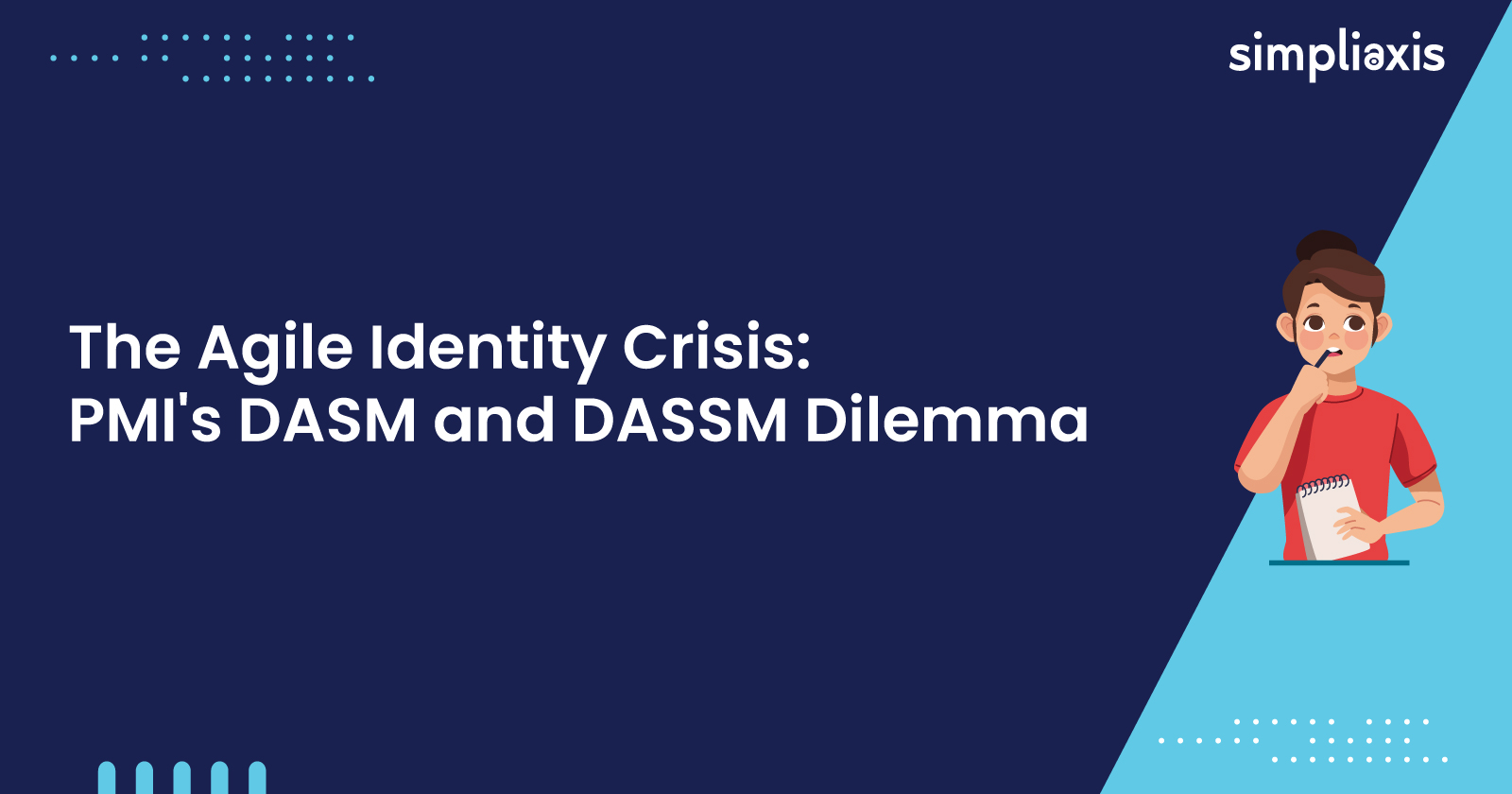The Agile Identity Crisis: PMI’s DASM and DASSM Dilemma

Overwhelmed by the number of Agile certifications offered by different organizations? True, your dilemma of choosing the right certification is evident because organizations are applying agile principles topped by certification programs. The certifications range from Entry to Top level of expertise.
PMI’s Pulse of Professions 2023 report shows projects with Agile methodologies achieved a remarkable 75.4% success rate. This shows the growth impact and momentum of agile practices in project management. The main takeaway is that Agile can transform outcomes and will prove invaluable in future projects. To work with these methodologies, you need the right certifications.
The Agile Identity Crisis
The Agile Identity Crisis likely revolves around confusion and debate surrounding PMI (Project Management Institute) certifications like DASM (Disciplined Agile Scrum Master) and DASSM (Disciplined Agile Senior Scrum Master). Scrum and SAFe (Scaled Agile Framework), two well-known agile frameworks, coexist with these credentials.
The Predicament
Despite the initial success, PMI’s recent changes to the Disciplined Agile Portfolio have led to an identity crisis. The shift from individual certification to group training and the introduction of new offerings like the Digital Disciplined Agile browser (DA browser) have many professionals questioning the future of DASM and DASSM.
There has been some conflict within the Agile Community due to PMI’s push into Agile and the launch of certifications like DASM and DASSM. This situation causes an identity crisis for several reasons:
- PMI Tradition versus Agile: PMI has historically been a scrum, just like the waterfall and many other traditional project management methods. In this respect, most associate agile with rigid process-driven practices that are often used in PMI formal certifications, such as the PMP. This focus on flexibility and incremental progress also throws up the capability of PMI to properly represent Agile methodologies at this stage.
- Agile Fragmentation: The word Agile is applied as a terminology of various frameworks and methodologies. Various interpretations of Agile principles are offered by methodologies such as Kanban, SAFe, and Scrum, among others. PMI’s Disciplined Agile Framework (DA) is an attempt to provide a more comprehensive and flexible approach that blends several methodologies. However, some argue that PMI’s DA framework doesn’t add anything new to what’s already available from other sources like Scrum Alliance or Scaled Agile.
- Confusion between Certifications: A further degree of complexity is introduced by the fact that DASM and DASSM are primarily focused on Scrum roles inside the Disciplined Agile Framework. DASSM Certification is for senior roles, whereas DASM is for people who are new to Agile. However, since many people already have Agile coaching or Scrum Master credentials from other firms, the certifications could cause confusion. There is an ongoing debate on whether PMI’s DASM and DASSM provide value beyond what is offered by existing Scrum certifications.
- The Wider Impact On The Agile Community: The Agile community is not just a collection of certified professionals; it is a vibrant ecosystem of practitioners, trainers, and thought leaders. PMI’s decision to phase out DASM and DASSM courses has implications that go beyond individual certifications. It impacts training providers, organizations relying on these certifications for skill development, and the broader narrative of Agile implementation in traditional project management settings.
- Market Competition: As more and more organizations seek to include Agile methodologies, there is an increasing number of certifications and frameworks arising, each supporting different methodologies and tools. DASM and DASSM by PMI added to an already saturated market, so business becomes difficult to differentiate between certifications that represent the essence of Agile.
- Community Feedback: The Agile community has voiced concerns about the evolving landscape. Some professionals feel that the changes may dilute the value of the certifications, while others believe that the new approach better aligns with the needs of modern organizations. The feedback has been a mix of support and skepticism, highlighting the need for PMI to communicate better its vision and strategy.
- Impact on Career Pathways: Many individuals have invested significant time and resources in obtaining DASM and DASSM Certifications. The recent changes have led to uncertainty regarding the future value and recognition of these certifications in the marketplace. PMI needs to address these concerns to maintain the confidence and trust of its credential owners.
To put it simply, the dilemma of DASM Certification and DASSM Certification by PMI mirrors the overall dilemma of striking a balance between the flexible, decentralized principles of Agile versus the more structured and process-driven approach of Agile. The PMI’s efforts to position itself close to the Agile movement prompt questions on whether it is strong enough in strategy before people heavily involved in the Agile environment get engaged.
As PMI continues to evolve its agile offerings, the organization must address these concerns of its community. Clear communication, transparency, and focus on the value these certifications bring to professionals and organizations will be the key to navigating this identity crisis.






